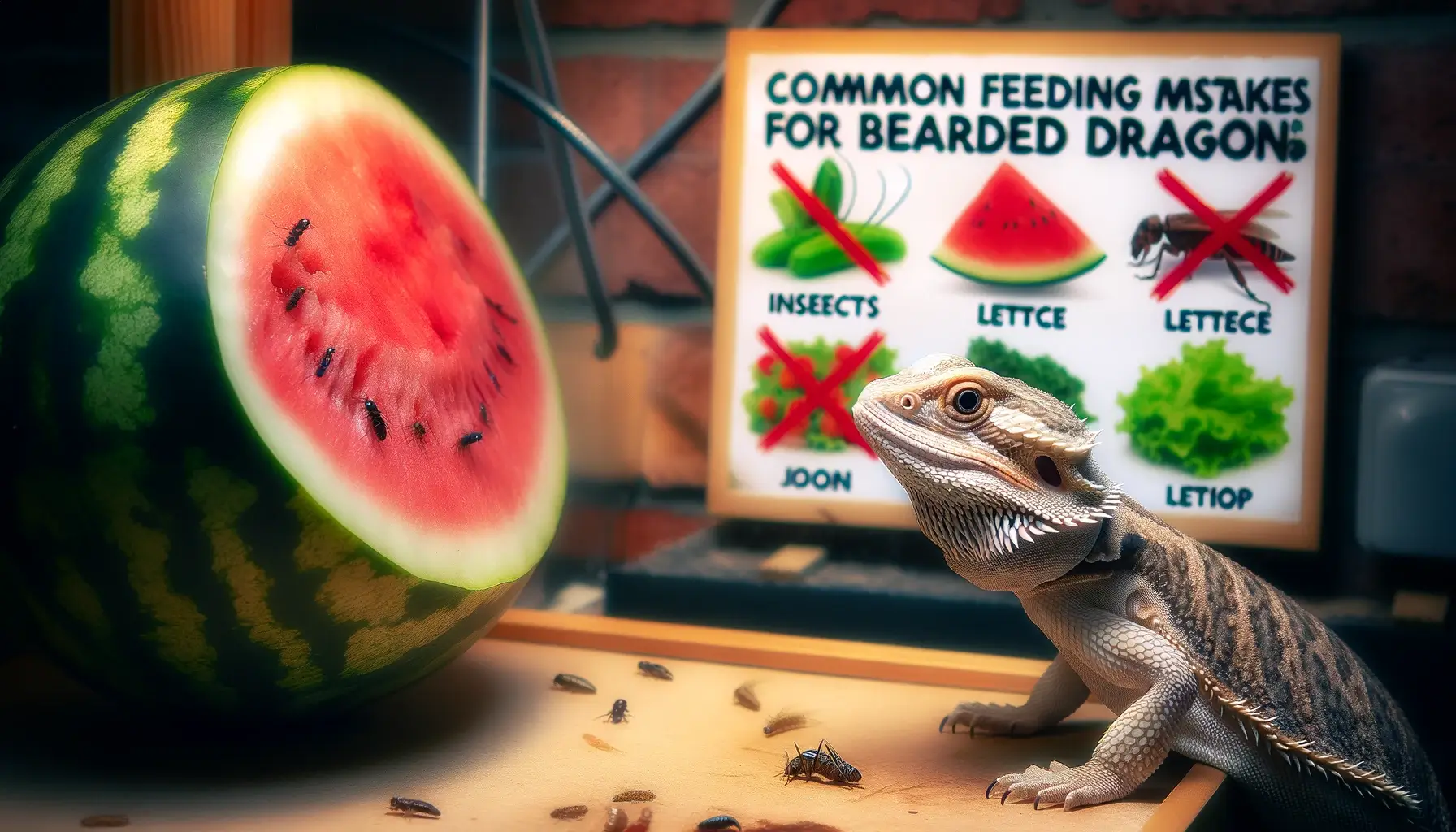Like navigating a maze, figuring out the right diet for your bearded dragon can be challenging. You might wonder, ‘Can bearded dragons eat watermelon?’ Yes, they can, but it’s not as simple as chopping up a piece and offering it to them. You need to be aware of certain guidelines and potential risks. So, before you make that feeding mistake that could prove detrimental to your pet’s health, wouldn’t you like to know more?
Bearded Dragon Diet
Your bearded dragon’s diet is pivotal in its overall health and wellbeing, requiring a balanced mix of insects, fruits, and vegetables for optimal nutrition. You may wonder, “Can bearded dragons eat watermelon?” The answer is yes but with moderation. Like us, they appreciate a juicy watermelon on a hot day.
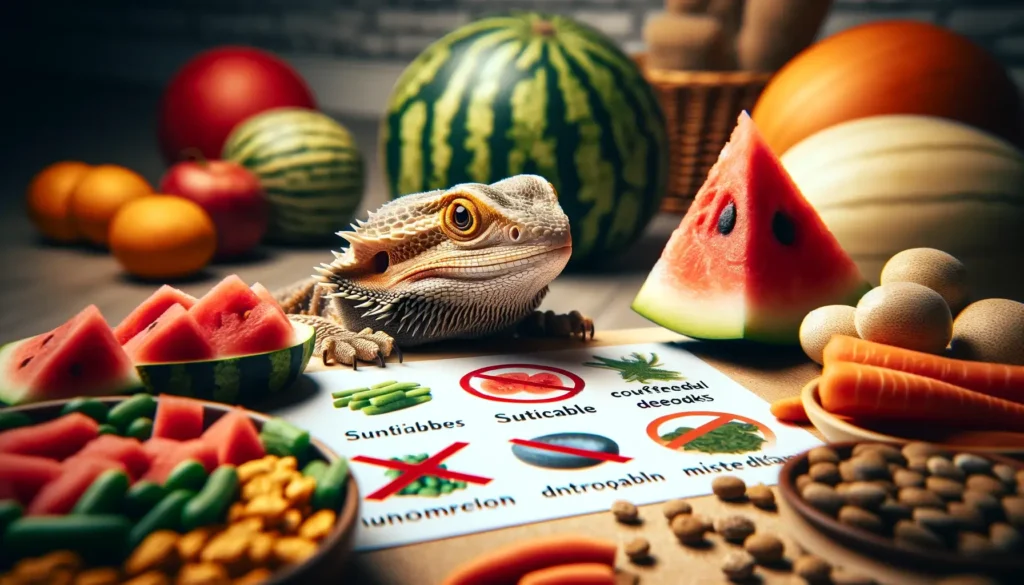
However, the watermelon should be seedless as seeds can pose a choking hazard. You might also ponder, “Can bearded dragons eat watermelon rind?” The answer is also a yes. Although not as tasty, the rind is safe and can be a crunchy treat.
You may be curious, “Can baby bearded dragons eat watermelon?” the answer is affirmative. Yet, feed them only small, finely chopped pieces to prevent choking.
You might also question, “How often can bearded dragons eat watermelon?” Infrequently is best. Watermelon is high in water and can lead to diarrhoea if fed excessively.
Lastly, “Can bearded dragons eat yellow watermelon?” Yes, they can. Yellow watermelon is as safe as red, but moderation is key. It’s all about balance and variety for your bearded dragon’s diet.
Potential Risks With Watermelon
While watermelon can be a refreshing treat for your bearded dragon, it’s crucial to consider a few potential risks associated with its consumption. You may wonder, can bearded dragons eat watermelon seeds? The answer is no. The seeds can be a choking hazard, and their hard shell can lead to digestive problems. Similarly, can bearded dragons eat watermelon leaves? Although some leafy greens are beneficial, avoiding watermelon leaves is best due to their high oxalic acid content, which can inhibit calcium absorption.
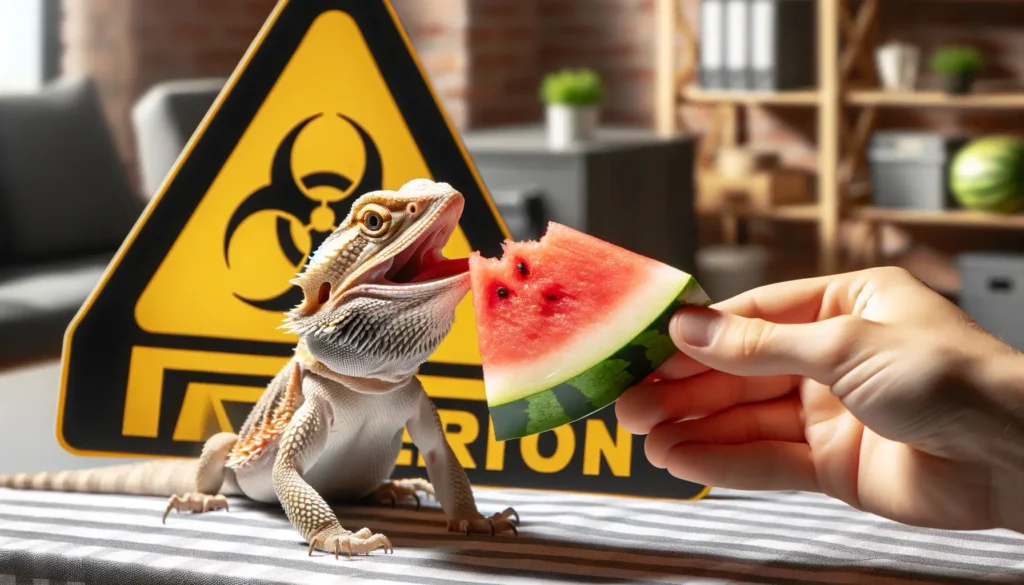
Another risk is the high water content in watermelons. As bearded dragons originate from arid regions, they’re not naturally equipped to process foods with a high water content. This can lead to diarrhoea, dehydration, and kidney complications. You must be cautious about how much watermelon your bearded dragon eats.
Lastly, watermelon is high in sugar. While it won’t be necessarily harmful in small amounts, overconsumption can lead to obesity, tooth decay, and even diabetes. So, while your bearded dragon can enjoy the occasional watermelon treat, it’s important to serve it in moderation and with knowledge of these potential risks.
Correct Watermelon Serving Methods
Given the potential risks, knowing the correct way to serve watermelon to your bearded dragon is essential. First, always opt for fresh, ripe watermelon. It’s full of vitamins and hydration that can benefit your pet’s health when consumed in moderation.
Next, the size of the pieces matters. Cut the watermelon into small, manageable pieces to prevent choking hazards. Bearded dragons don’t chew their food like we do; they swallow it whole. Hence, the smaller the piece, the safer it is.
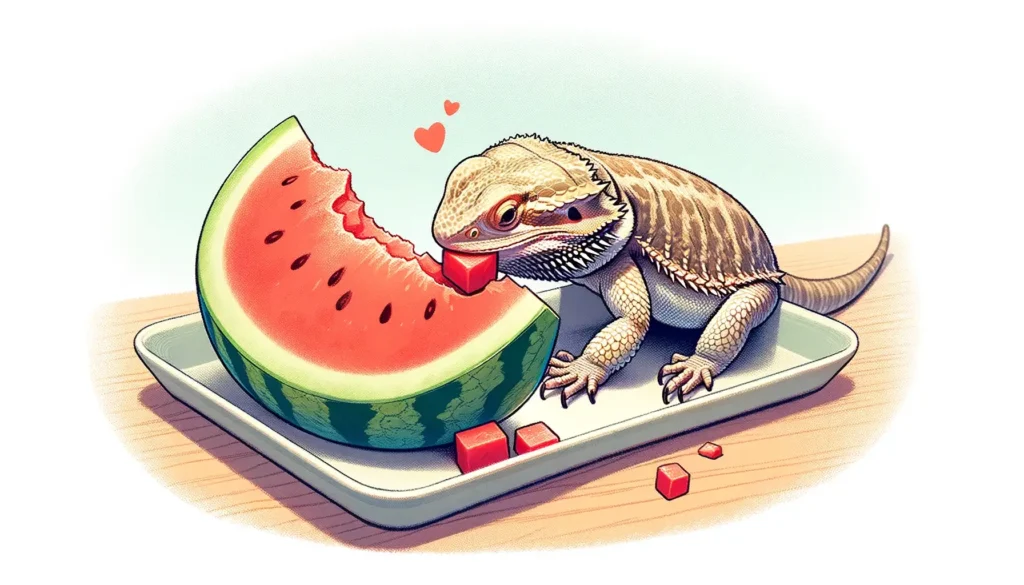
Another key aspect is frequency. Despite its benefits, watermelon should not be a daily part of your dragon’s diet. It is best to treat it as an occasional snack, once or twice a week at most.
Lastly, always remove any uneaten watermelon from your dragon’s habitat promptly. This will prevent bacterial growth, which could lead to health issues.
The Truth About Watermelon Seeds
Understanding that watermelon seeds may pose a potential risk to your bearded dragon’s health is crucial. Despite their tiny size, these seeds are hard and indigestible for bearded dragons. Given their small body size and delicate digestive system, consuming watermelon seeds can cause serious health complications.
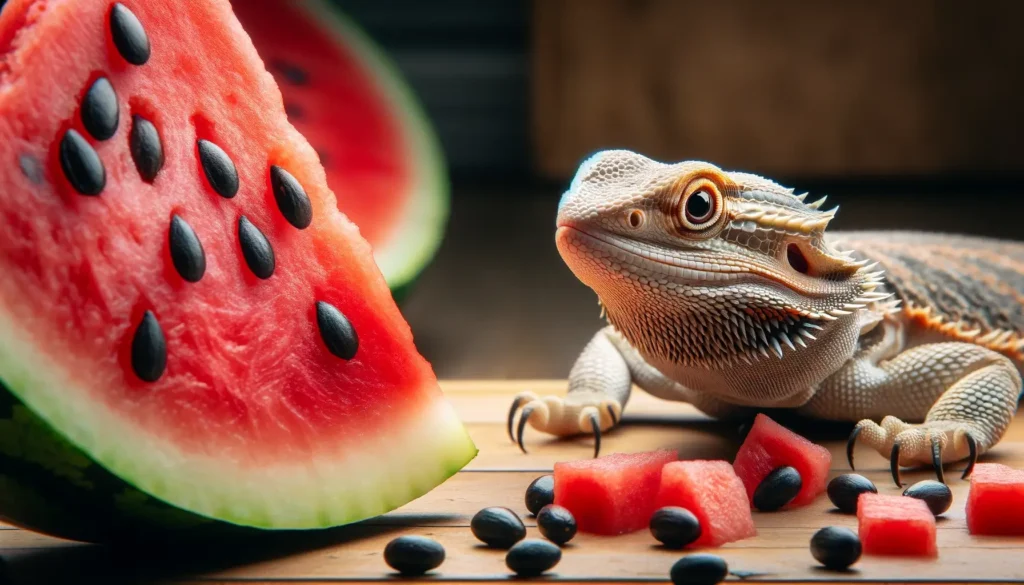
Here are a few key points to keep in mind:
- Watermelon seeds are hard to digest and can cause impaction, a severe condition where the digestive tract becomes blocked.
- The seeds can become lodged in a dragon’s intestines, leading to discomfort and possibly requiring surgical removal.
- Choking is another risk. If a seed is accidentally inhaled instead of swallowed, it can block the airway.
- Lastly, seeds are nutritionally insignificant for bearded dragons. They contain no essential nutrients that your pet needs.
Therefore, when serving watermelon to your bearded dragon, ensure the fruit is seedless. It’s a simple precaution that can save you and your pet from unnecessary distress. Remember, the goal is to provide a healthy, safe, and beneficial diet for your bearded dragon’s overall wellbeing.
Feeding Baby Bearded Dragons
When it comes to feeding your baby bearded dragon, you’ll need a different approach compared to an adult dragon, given their unique dietary requirements and smaller size. Baby bearded dragons, also known as juveniles, should have a diet primarily of insects, as their bodies require more protein to support their rapid growth and development. Small crickets, mealworms, and other soft-bodied insects comprise the bulk of their diet.
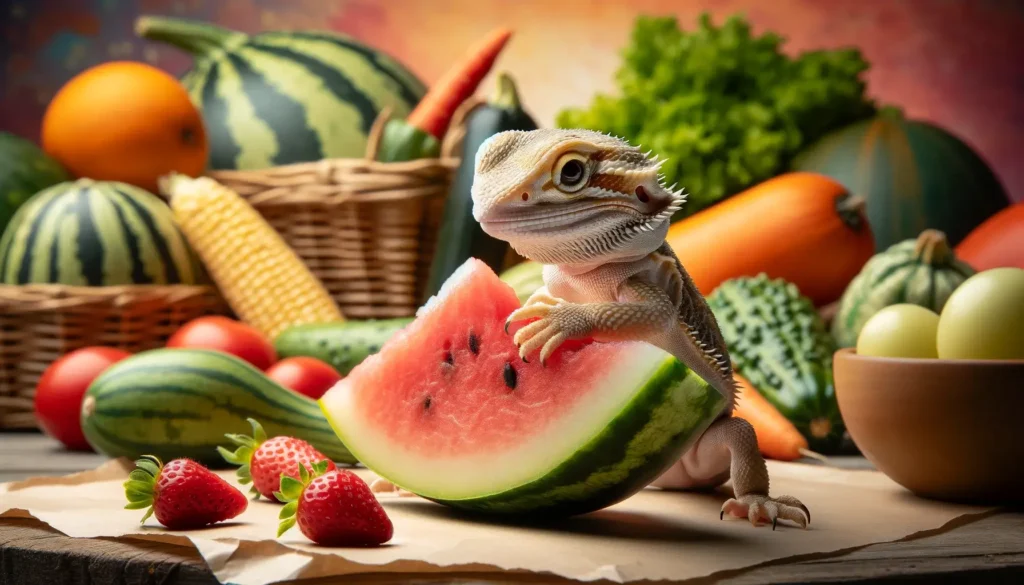
However, that doesn’t mean you should exclude fruits and vegetables entirely. They should constitute around 20% of your bearded dragon’s diet. This is where watermelon can come in. Cut into tiny, manageable pieces, watermelon can be a refreshing, hydrating snack for your pet. It’s packed with vital nutrients like vitamins A and C, contributing to your baby bearded dragon’s overall health and wellbeing.
Remember to offer these foods in a shallow feeding dish to make it easy for your pet to access. Remember that overfeeding can lead to obesity and other health issues, so monitoring your pet’s intake is crucial. With this balanced diet, your baby bearded dragon can thrive, growing into a healthy, robust adult.
Common Bearded Dragon Feeding Mistakes
Even the most diligent pet owners can make common feeding mistakes that may negatively affect the health of their bearded dragons. These mistakes can be harmful, sometimes even fatal, so it’s essential to identify and correct them.
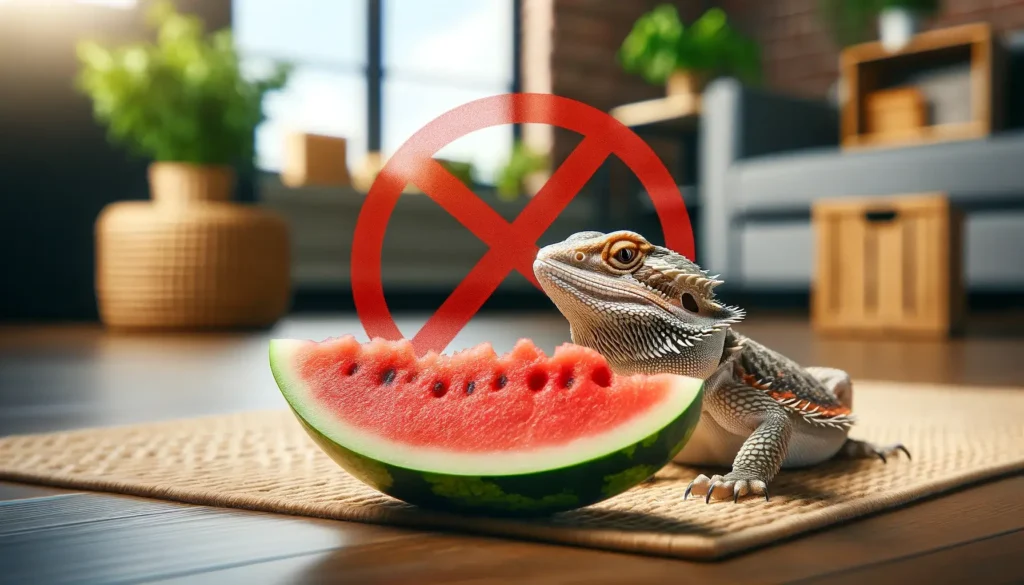
Here are some common feeding mistakes:
Overfeeding or underfeeding: It’s a delicate balance. Overfeeding can lead to obesity and related health issues, while underfeeding can result in malnutrition and stunted growth.
Feeding the wrong foods: Bearded dragons eat insects and plants, but not all are safe or healthy. For example, avocados are toxic to them, and iceberg lettuce provides little nutritional value.
Offering improper food size: The size of the food should correspond with the size of your bearded dragon. A good rule of thumb is never to feed your pet anything larger than the space between its eyes.
Ignoring hydration: Though they hail from arid environments, bearded dragons still need water. Don’t rely solely on food for hydration; ensure they can access a shallow dish of fresh water.

